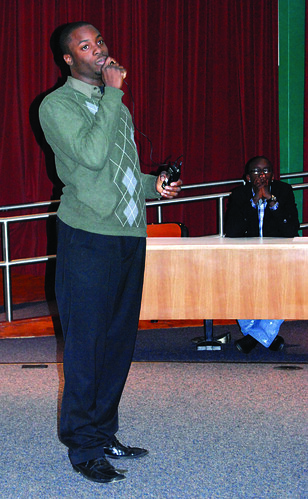The film “Rebirth” highlights the story of a Nigerian man who contracted HIV.
On Nov. 12, Temple hosted what Nigerian director Bolanle Ninalowo and his partnering organizations hope will answer the question: “How does one get people to talk about a disease if they don’t want to face the thought that they might contract it?” Ninalowo did this in perhaps unlikely way – entertainment.

Kiva Auditorium in Ritter Hall was filled with laughter during the Philadelphia premiere of “Rebirth,” Ninalowo’s story of a young Nigerian man whose hedonistic lifestyle comes to a sudden halt when he discovers he may have contracted HIV. While it may seem strange for a film with such a serious topic to elicit laughter, that was the goal. By entertaining the audience, “Rebirth” lets viewers approach the sensitive issue more comfortably.
Director Tony Abara and Kam Chidiebere from UNIHIV, an organization that promotes awareness of HIV/AIDS across the country through entertainment and charity events, described the audience’s reaction as receptive.
“The interesting thing about this movie is that it’s talking about a subject that is very serious,” Chidiebere said. “A lot of people speaking about HIV are nervous, and the movie is funny, so it makes you relax and take in the message that it’s trying to send you.”
“I think the atmosphere says it all,” Abara added. “People were laughing, [and] people had a good time. It’s always good if we can all get together like this to watch a movie that’s very educational, and be happy about it.”
The event’s organizers hoped to lead viewers to think more about the disease and its possible impact on their lives. Audience members seemed to agree the film was effective in breaking down barriers around discussing the disease.
“I thought it was very funny,” said Adedun Aderemi, an Arcadia University student who attended the premiere. “It had a lot of information and talked about living with HIV, which a lot of people are really scared about.”
“Rebirth” arrived in Philadelphia due to a series of connections between organizations with a mutual interest in spreading awareness about HIV/AIDS among African communities. Ninalowo, who contacted UNIHIV in regards to the film, made the first of these connections.
“The director is a very passionate person about HIV/AIDS, especially in Nigeria, so he found out about UNIHIV, and he came to us,” said Mercy Opara, the Philadelphia ambassador for UNIHIV. “We all got together and said, ‘OK, I think people would pay more attention if we put this in a movie.’”
Opara is also a member of the Society of Emerging African Leaders, a student organization that seeks to foster new, young leadership to help bring about positive change in Africa. She said she felt Temple would be a great place to view the movie so she had SEAL connect with the African American studies program at Temple, which led to the event.
Before the movie premiere, an array of guest speakers discussed different topics on HIV/AIDS awareness. Farhiya Tifow, the president of SEAL, was one of the speakers present at the movie’s viewing.
“If we’re trying to be young African leaders, there are certain characteristics we identify with that,” Tifow said. “Being responsible, being accountable. This movie not only tries to spread information about HIV, but also that if you have it, you can live with it, so it was another way we could provide information to our members that would help educate them.”
Tifow said that through that education, the rest of the world’s perception of Africa can be changed for the better.
“We feel that a lot of the time Africa has a negative connotation to it in the international media,” Tifow said. “What we say is, ‘let your African voice be heard.’ Talk about the positive things that Africa has, the young upcoming leaders within Africa that are making a change not only in politics, but in science and technology.”
SEAL’s efforts to promote the film’s premiere at Temple were aided by one of its partners on campus, the Organization of African Students, whose goal is to spread education and awareness of the African culture.
“[HIV/AIDS] is one of the issues that is pertinent to awareness about our culture and our heritage because it’s part of the current Africa,” said Debbie Aderinto, the Organization of African Students president.
Opara agreed with the importance of spreading knowledge about HIV/AIDS and explained what the viewers thought about this message before and after the screening.
“The reaction has been very positive,” she said. “Before we show the movie, we ask people what they think about HIV/AIDS, and we’ve found out so many people thought, ‘I’m not sexually active, [so] I don’t want to go,’ or ‘I’m sexually active, but I’m with one person so I don’t have to go.’ But after the movie they’re thinking, ‘Well, maybe I really should get tested.’”
Erik Lexie can be reached at erik.lexie@temple.edu.


Be the first to comment